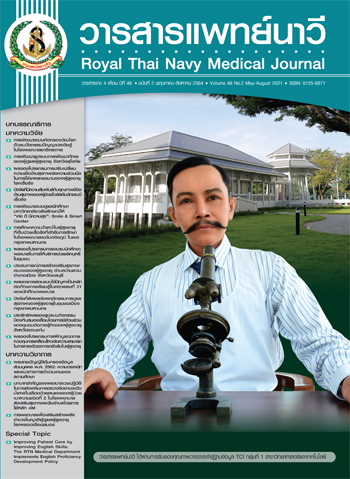ผลของโปรแกรมการอบรมนักศึกษาพยาบาลในการให้บริการช่วยเลิกบุหรี่ในชุมชน
Main Article Content
บทคัดย่อ
การวิจัยนี้เป็นวิจัยกึ่งทดลอง เพื่อศึกษาผลของโปรแกรมการอบรมนักศึกษาพยาบาลในการให้บริการช่วยเลิกบุหรี่ในชุมชน จังหวัดนครปฐม กลุ่มตัวอย่างเป็นนักศึกษาพยาบาลชั้นปีที่ 4 จำนวน 70 คน แบ่งเป็นกลุ่มทดลอง 35 คน และกลุ่มควบคุม 35 คน โดยกลุ่มทดลองได้รับโปรแกรมการอบรมการให้บริการช่วยเลิกบุหรี่ในชุมชน เป็นระยะเวลา 1 วัน และติดตามผลภายหลังได้รับการอบรมทันที และหลังได้รับการอบรม 6 สัปดาห์ ส่วนกลุ่มควบคุมได้รับการแจกเอกสารเกี่ยวกับความรู้เรื่องบุหรี่และการให้บริการช่วยเลิกบุหรี่ เก็บรวบรวมข้อมูลด้วยการตอบแบบสอบถามด้วยตนเองก่อนการอบรม หลังการอบรมทันที และหลังการอบรม 6 สัปดาห์ วิเคราะห์ข้อมูลเปรียบเทียบความแตกต่างของค่าเฉลี่ยของคะแนนความรู้ ทัศนคติ และความเชื่อมั่นในความสามารถของตนเองในการให้บริการช่วยเลิกบุหรี่ของกลุ่มทดลอง ด้วยสถิติการวิเคราะห์ความแปรปรวนทางเดียวแบบวัดซ้ำ เปรียบเทียบความแตกต่างของค่าเฉลี่ยของคะแนนการให้บริการช่วยเลิกบุหรี่ก่อนและหลังการอบรมด้วยสถิติการทดสอบทีแบบไม่อิสระ และเปรียบเทียบความแตกต่างระหว่างกลุ่มด้วยสถิติการทดสอบทีแบบอิสระ
ผลการศึกษา พบว่า ค่าเฉลี่ยของคะแนนความรู้และความเชื่อมั่นในความสามารถของตนเองในการให้บริการช่วยเลิกบุหรี่ภายหลังการอบรม 6 สัปดาห์ สูงกว่าหลังการอบรมทันทีและก่อนการอบรม อย่างมีนัยสำคัญทางสถิติ (p < .01) ค่าเฉลี่ยของคะแนนทัศนคติในการให้บริการช่วยเลิกบุหรี่ภายหลังการอบรม 6 สัปดาห์ สูงกว่าก่อนการอบรม อย่างมีนัยสำคัญทางสถิติ (p < .05) แต่พบว่า ค่าเฉลี่ยของคะแนนทัศนคติในการให้บริการช่วยเลิกบุหรี่ในระหว่างก่อนการอบรมและหลังการอบรมทันที ไม่แตกต่างกัน ค่าเฉลี่ยของคะแนนการให้บริการช่วยเลิกบุหรี่ภายหลังการอบรม 6 สัปดาห์ สูงกว่าก่อนการอบรม อย่างมีนัยสำคัญทางสถิติ (p < .01) ค่าเฉลี่ยของคะแนนความรู้ ทัศนคติ ความเชื่อมั่นในความสามารถของตนเองในการให้บริการช่วยเลิกบุหรี่ในชุมชน และการให้บริการช่วยเลิกบุหรี่ในชุมชนในระยะหลังการอบรม 6 สัปดาห์ ของกลุ่มทดลองสูงกว่ากลุ่มควบคุม อย่างมีนัยสำคัญทางสถิติ (p < .01) การศึกษาเสนอแนะว่า โปรแกรมการอบรมนักศึกษาพยาบาลในการให้บริการช่วยเลิกบุหรี่ในชุมชนประสบความสำเร็จในการเพิ่มพูนความรู้ ทัศนคติ ความเชื่อมั่นในความสามารถของตนเองในการให้บริการช่วยเลิกบุหรี่ และการให้บริการช่วยเลิกบุหรี่ การศึกษาครั้งต่อไปควรจะพัฒนาโปรแกรมการให้บริการช่วยเลิกบุหรี่ในรูปแบบอื่นๆ ที่ต่อเนื่อง ทันสมัย ง่าย และสะดวกในการเข้าถึงข้อมูลสำหรับนักศึกษาพยาบาลที่ฝึกปฏิบัติงานในสาขาอื่นๆ เพื่อเป็นการเสริมสร้างความเข้มแข็ง และศักยภาพในการให้บริการช่วยเลิกบุหรี่ที่มีคุณภาพต่อไป
Article Details

อนุญาตภายใต้เงื่อนไข Creative Commons Attribution-NonCommercial-NoDerivatives 4.0 International License.
เอกสารอ้างอิง
World Health Organization. Tobacco. [Internet]. [cited 2020 October 24]. Available from: https://www.who.int/health-topics/tobacco.
Kraturerk W, Benjakul S, Kengganpanich M, Kengganpanich T. The effects of the smoking cessation program applying the social cognitive theory among naval rating students at Naval Education Department, Royal Thai Navy. Royal Thai Navy Medical Journal 2021;47(2):317-39.
Center for Continuing Pharmaceutical Education, The Pharmacy Council. Academic conference project “drug stores volunteer to quit smoking”. [Internet]. [cited 2020 October 24]. Available from: https://ccpe.pharmacycouncil.org/index.php?(in Thai).
- Tobacco Control Research and Knowledge Management Center. Thailand tobacco consumption statistic report 2018. [Internet]. [cited 2020 October 24]. Available from: https//https://www.trc.or.th/th2561.html. (in Thai).
Grimm J, Fildes E. Tobacco cessation brief intervention training for undergraduate nursing students. International Journal of Case Reports & Studies 2019;3(1):108-11.
Chaiyasung P, Tana P, Sridet R, Wises N. The efficiency of potential development on knowledge and counselling skills on smoking cessation via online in educational institution among nursing student leaders. Thai Journal of Nursing 2020;69(1):36-43. (in Thai).
United Nations Development Programme. Capacity building the UNDP approach 2013. [Internet]. [cited 2020 October 24]. Available from: http://www.gdrc.org/uem/undp-cb.html.
Bandura A. Self-efficacy. In: Ramachaudran VS, editor. Encyclopedia of human behavior. New York: Academic Press; 1994.
Prochaska J0, Norcross JC, Diclemente CC. Changing for good: a revolutionary six-stage program for overcoming bad habits and moving your life positively forward. New York: Harper Collins Publishers; 2006.
Best WJ. Research in education. 4th ed. New Jersey: Prentice – Hall Inc; 1981.
Preechawong S, Vathesathogkit K, Suwanratsamee S. Effects of tobacco cessation counseling training on Thai professional nurses’ self-efficacy and cessation counseling practices. Pacific Rim International Journal of Nursing Research 2011;15(1):3-12.
Hasan SI, Mohd HF, Ahmad TNA, Amer SN. Empowering healthcare providers through smoking cessation training in Malaysia: a preintervention and postintervention evaluation on the improvement of knowledge, attitude and self-efficacy. British Medical Journal 2019;9(9):1-11.
Chan SS, Sarna L, Wong DC, Lam TH. Nurses' tobacco-related knowledge, attitudes, and practice in four major cities in China. Journal of Nursing Scholarship 2007;39(1):46-53.
Sheffer CE, Barone C, Anders ME. Training nurses in the treatment of tobacco use and dependence: pre- and post-training results. Journal of Advance Nursing 2011;67(1):176-83.
Choi SH, Kim YH. Effects of smoking cessation intervention education program based on blended learning among nursing students in South Korea. Osong Public Health and Research Perspectives 2018;9(4):185-91.

